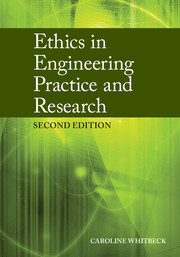Book contents
- Frontmatter
- Contents
- Note to Students
- Foreword to the First Edition
- Preface to the First Edition
- Acknowledgment
- Acknowledgments to the First Edition
- Part 1 Values and the Evaluation of Acts in Engineering
- Part 2 Engineering Responsibility
- 3 Ethics as Design ??? Doing Justice to Moral Problems
- 4 Central Professional Responsibilities of Engineers
- 5 Computers, Software, and Digital Information
- 6 Rights and Responsibilities Regarding Intellectual Property
- 7 Workplace Rights and Responsibilities
- Part 3 Responsible Research Conduct
- Part 4 The Future of Engineering
- References
- Index
- References
4 - Central Professional Responsibilities of Engineers
Published online by Cambridge University Press: 05 June 2012
- Frontmatter
- Contents
- Note to Students
- Foreword to the First Edition
- Preface to the First Edition
- Acknowledgment
- Acknowledgments to the First Edition
- Part 1 Values and the Evaluation of Acts in Engineering
- Part 2 Engineering Responsibility
- 3 Ethics as Design ??? Doing Justice to Moral Problems
- 4 Central Professional Responsibilities of Engineers
- 5 Computers, Software, and Digital Information
- 6 Rights and Responsibilities Regarding Intellectual Property
- 7 Workplace Rights and Responsibilities
- Part 3 Responsible Research Conduct
- Part 4 The Future of Engineering
- References
- Index
- References
Summary
The Centrality of Responsibility in Professional Ethics
What characteristics or behavior on the part of the professionals on whose work your own welfare depends would qualify them as trustworthy?
In today's era of specialized knowledge, we all must depend on professionals for our safety, health, and well-being. What a person needs from an engineer, a health care provider, or any other professional is more than that the professional obey simple rules of practice and ethics. What each of us needs of professionals is that they exercise their professional judgment to devise a plan for securing us a good outcome in our specific situation. Exercising professional judgment typically requires more than following simple rules. It requires taking into account a range of factors, marshaling relevant parts of the body of knowledge specific to one's profession, and devising a course of action that achieves a good (or even ???the best???) outcome in the circumstances. Because exercising judgment (rather than simply following a rule) requires higher cognitive functions and some intellectual maturity, the subject of professional judgment and the moral responsibility that goes with it has been left for this and later sections of this book, sections that are addressed to juniors, seniors, and graduate students.
- Type
- Chapter
- Information
- Ethics in Engineering Practice and Research , pp. 155 - 191Publisher: Cambridge University PressPrint publication year: 2011



